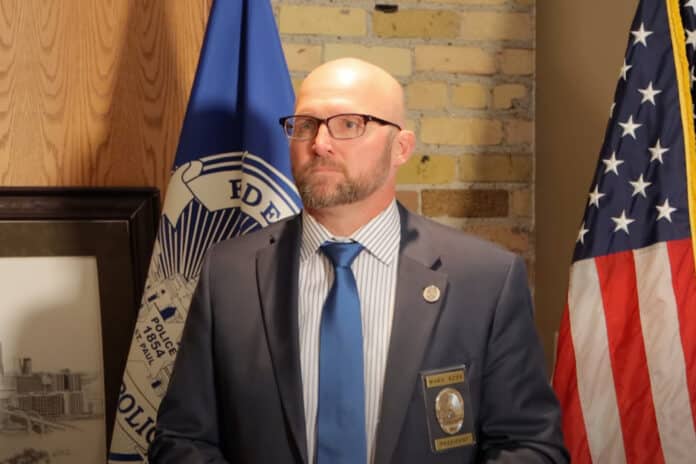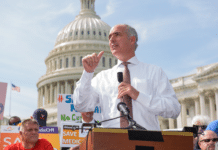
Taking police officers out of high schools was a bad idea, according to one St. Paul police officer. Devin Scott might still be alive if a school resource officer (SRO) had been in the building that day, he said.
Scott was stabbed to death by another student at Harding High School in St. Paul last month. A 16-year-old student was charged with murder.
“If an SRO had been in the building, they could have put systems in place to help Scott be successful,” said Mark Ross, president of the St. Paul Police Federation.
The St. Paul Board of Education voted to remove officers from schools after the death of George Floyd in 2020. They said having a “gun and a badge in school made kids uneasy.”
However, since officers have been removed from schools, civilians have been hired to deal with criminal issues and violence has surged.
Ross is a former SRO. He said the goal of an SRO is to help kids and create a safe environment. The presence of police in the building makes a difference.
“Any good SRO would have had a very good handle on this kid’s background, who his friends are, who his allies were, and where the potential problems were,” he said. “You can even help craft a schedule in such a way that he was not having lunch with those kids and they’re not in the same area of the building at the same time.”
While some believe police corrupt the atmosphere in the building, Ross said police can deter crime and disruptive behavior. He said despite bad press, the goal of a resource officer is to help kids be successful.
“We want to help them. That’s the goal,” he said. “If we can actually take one of these kids and make it a positive experience, that’s the ultimate goal. But we have to be realistic, it doesn’t always happen.”
Ross said Scott was an administrative transfer at Harding, which means he had been “kicked out” of his previous school.
Resource officers know an administrative transfer means the student was not able to succeed at another school.
However, SROs take the time to get to know struggling kids and develop relationships.
“It’s all about creating a safer environment in school,” he said. “To be an effective SRO, you have to be passionate about it and you have to want to be there. You have to want to be good at it. The school has to want it, too.”
Ross said as an SRO, it is important to let kids know the expectations.
“You can’t sell drugs here. You can’t fight here. Don’t even think about bringing a weapon here because I’m going to be paying attention,” he said.
He said, contrary to popular belief, arrest is the last resort for an SRO.
“We would try and do everything but arrest somebody. Although on some occasions, that was the most appropriate outcome, and we would end up arresting people,” he said.
Ross said he doesn’t know all of the facts in Scott’s case, but he said one student can change the entire atmosphere of a school.
“The culture can change in an instant. There can be a lot of tension when a new kid comes in that’s had a penchant for problems,” he said.
Ross said he thinks positive outcomes are possible. He said some students would be amazed when they returned to school after suspension.
“I’d go over to shake their hand and let them know I was sorry this happened,” he said. “Young men in their 20s and early 30s have thanked me. Relationships are much stronger than people think. We spend way more time helping kids than anything else.”
He said being a police officer is the greatest job he’s ever had, and it is “super rewarding.” Like any professional, he said officers can always do better.
He said the community has been loud and clear about their expectations of police officers, but the message comes with mixed signals.
“On the one hand, they say, they need community policing, and we need to be more engaged with our kids. Then they kick us out of the schools. Those two things don’t reconcile,” he said.
He said 90 percent of teachers and students want officers there.
Ross said there has been a massive departure from St. Paul Public Schools in the last couple of years.
“People know it’s just not safe so they go to other places. The charter schools are just growing like crazy right now because [parents] don’t want to go to the St. Paul Public Schools,” he said.
The full interview with St. Paul Police Federation President Mark Ross is included in a new education podcast coming soon from Alpha News reporter Sheila Qualls. Subscribe here for updates.
Sheila Qualls
Sheila Qualls is an award-winning journalist and former civilian editor of an Army newspaper. Prior to joining Alpha News, she was a Christian Marriage and Family columnist at Patheos.com and a personal coach. Her work has been published in The Upper Room, the MOPS blog, Grown and Flown, and The Christian Post. She speaks nationally on issues involving faith and family.

















